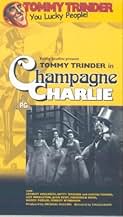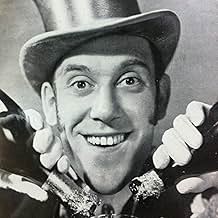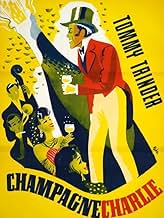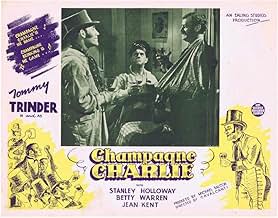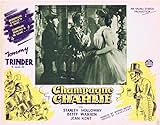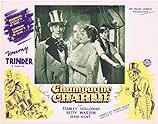The story of a 19th century English music hall performer and life behind the scenes.The story of a 19th century English music hall performer and life behind the scenes.The story of a 19th century English music hall performer and life behind the scenes.
- Director
- Writers
- Stars
Bill Shine
- Mogador Stage Manager
- (as Billy Shine)
Andreas Malandrinos
- Gatti
- (as Andrea Malandrinos)
Peter De Greef
- Lord Petersfield (His Son)
- (as Peter De Greeff)
- Director
- Writers
- All cast & crew
- Production, box office & more at IMDbPro
Featured reviews
This film is the nearest that Ealing Studios came to making a musical, but the final result is something quite different from that of MGM or Warner Bros. Imagine a full blooded b/w Victorian etching, lit by gas lamps and studded with glittering period detail. The songs are brash, catchy and bright. The direction by Cavancanti brings in his documentary realism with fast cutting, high and low angle shots - breaking with convention at every chance. The result of all this is that the film has hardly dated. It isn't well known, but it ought to be rediscovered. The photography sparkles and shines on carefully recreated 1860 London settings. If the film has a fault, it is that in trying to avoid formula, it often skips over details. For example, we aren't given time to understand how many of the songs are written. The title character was a real life singer - George Leybourne. Wartime comedian Tommy Trinder is obviously enjoying the part and Stanley Holloway provides strong support. In 1944 this film was designed to raise morale and generate goodwill. It still does.
There's a lot of Victorian music hall songs in this film about a man who travels from Leybourne in the north down to London to help his brother get a job in a boxing ring. After he sings a song in a bar ("an 'alf of 'alf an' 'alf"), he is taken on as a singer and later gets a job in a music hall, which is a dinner theatre, not like on "The Good Old Days". A parliamentary enquiry aims to shut down music halls for intemperate behaviour. Stanley Holloway is "The Great Vance", a rival in another music hall. Songs include "Don't bring shame on the old folks", the risqué "Come On Algernon", "'it 'im on the boko", "Strolling in the park" , then a series of drink related songs (which all sound very similar) - "Ale, old ale", "I like a drop of gin", "Burgundy, claret and port", "Yo ho ho rum", "The brandy and seltzer boys", "A glass of sherry wine", and the title "Champagne Charlie". Then "The daring young man on the flying trapeeze", and the risqué "Hunting after dark", and "By and by".
The rivalry between George Laybourne and The Great Vance in the music hall era.
I enjoyed this for its affectionate look into a bygone era of British culture, it's amusing characters and impressive set pieces.
The plot is a character-driven and fairly nonintrusive excuse to show a number of musical hall sequences and songs relating to the era. It is very much a film of two halves, with the rivalry between the two great musical hall stars in the first half and the struggle to keep the musical halls open taking focus in the second. A sub-plot involves a fairly uninspired romance.
There are a number of pub and musical hall set-pieces that work very well to capture the tone of the movie and it's subject matter. I found all these scenes highly entertaining. I try to imagine myself watching this in 1944 when the world was in devastation and in need of some positive escapism. It hardly feels authentic Victorian Britain, bit it certainly makes you want to go out, have a few drinks and enjoy yourself in a crowd of friends.
The songs are all good fun but pretty forgettable in the grand scheme of movie music. For me it's all the social settings, high energy, humour and enthusiasm that give it charm.
Performances are mixed, with charismatic stars Tommy Trinder and Stanley Holloway excellent as the above mentioned protagonists, but for me its Betty Warren who holds it altogether with a quite dominant turn as Bessie Bellwood. Most supporting roles are fairly uninspired, however Jean Kent does have a certain presence Dolly.
It's remarkable when you consider that this era depicts entertainment that predates radio broadcasting. Outside of church, this would have been a victorian equivalent of screen time. You look around at the world now and marvel at how much investment and technology has gone into providing people with that continual fix in the palm of their hand.
For me its 6.5/10, but I round upwards.
I enjoyed this for its affectionate look into a bygone era of British culture, it's amusing characters and impressive set pieces.
The plot is a character-driven and fairly nonintrusive excuse to show a number of musical hall sequences and songs relating to the era. It is very much a film of two halves, with the rivalry between the two great musical hall stars in the first half and the struggle to keep the musical halls open taking focus in the second. A sub-plot involves a fairly uninspired romance.
There are a number of pub and musical hall set-pieces that work very well to capture the tone of the movie and it's subject matter. I found all these scenes highly entertaining. I try to imagine myself watching this in 1944 when the world was in devastation and in need of some positive escapism. It hardly feels authentic Victorian Britain, bit it certainly makes you want to go out, have a few drinks and enjoy yourself in a crowd of friends.
The songs are all good fun but pretty forgettable in the grand scheme of movie music. For me it's all the social settings, high energy, humour and enthusiasm that give it charm.
Performances are mixed, with charismatic stars Tommy Trinder and Stanley Holloway excellent as the above mentioned protagonists, but for me its Betty Warren who holds it altogether with a quite dominant turn as Bessie Bellwood. Most supporting roles are fairly uninspired, however Jean Kent does have a certain presence Dolly.
It's remarkable when you consider that this era depicts entertainment that predates radio broadcasting. Outside of church, this would have been a victorian equivalent of screen time. You look around at the world now and marvel at how much investment and technology has gone into providing people with that continual fix in the palm of their hand.
For me its 6.5/10, but I round upwards.
Nostalgia is everything it's cracked up to be in Champagne Charlie, a valentine from Ealing Studios and Alberto Cavalcanti to English music halls. Ostensibly, it's the story of George Leybourne (Tommy Trinder) and his rivalry with Alfred Vance, the Great Vance (Stanley Holloway), in the music halls of mid-Victorian England. The music halls hadn't yet become the more respectable theaters of England, from which they lasted in full glory until television appeared. In the 1860s they usually were big ale houses, unsophisticated drinking and singing establishments for the working man and his lady. In this movie's view, they were often rambunctious, loud, jolly and great fun, where the swells often showed up to see the latest entertainment, which included young dancers, and everyone joined in the songs. There's a smattering of a plot beyond the rivalry (which includes a ludicrous duel at one point between the equally nervous Leybourne and Vance) involving attempts to close the music halls down and a romance between a duke's son and the daughter of Bessie Bellwood (Betty Warren), a music hall owner and singer who employs Leybourne.
The interest is in the the story of Leybourne, who becomes Champagne Charlie. He's played with enthusiasm and great cheer by Tommy Trinder, who was a hugely popular stage and later radio entertainer in the Thirties, Forties and Fifties. Trinder was a tall Cockney with a long face, round eyes, a lot of teeth and personality to spare. The first 50 minutes of the movie, in fact, is largely Trinder and Holloway performing song after song in the gas-lit music halls, always strutting their best stuff as they try to out-perform each other with drinking songs and stage power. It's a grand show, with the ale flowing, the smoky atmosphere, crowds of warm bodies having a great time...it's good cheer all around even with the plot. Hearing and seeing Trinder prance about performing Champagne Charlie; Hit Him on the Boko; Ale Old Ale; Burgundy, Claret and Port; I'm One of the Brandy and Seltzer Boys; and Everything Will Be Lovely...or hearing and seeing Holloway sell Strolling in the Park; I Do Like a Little Drop of Gin; Rum, Rum, Rum; A Glass of Sherry Wine; and Hunting After Dark...is to wish you were back there, too, downing a pint and singing with them.
If it had been possible in war-time Britain for this movie to have been made in Technicolor, Champagne Charlie would not be the forgotten museum piece it has become. The settings in the music halls cry out for lush color. For those who love English music halls, try Lost Empires. It's a multi-part TV miniseries from 1986 based on the novel by J. B. Priestly. It tells the story of Richard Herndon, played by Colin Firth, who joins his uncle for a year of touring on the Empire music hall circuit before WWI starts. Lawrence Olivier in his next to last theatrical appearance plays an aging song-and-dance man long past his prime. Lost Empires is a fine drama which expertly recreates the atmosphere and the acts.
The interest is in the the story of Leybourne, who becomes Champagne Charlie. He's played with enthusiasm and great cheer by Tommy Trinder, who was a hugely popular stage and later radio entertainer in the Thirties, Forties and Fifties. Trinder was a tall Cockney with a long face, round eyes, a lot of teeth and personality to spare. The first 50 minutes of the movie, in fact, is largely Trinder and Holloway performing song after song in the gas-lit music halls, always strutting their best stuff as they try to out-perform each other with drinking songs and stage power. It's a grand show, with the ale flowing, the smoky atmosphere, crowds of warm bodies having a great time...it's good cheer all around even with the plot. Hearing and seeing Trinder prance about performing Champagne Charlie; Hit Him on the Boko; Ale Old Ale; Burgundy, Claret and Port; I'm One of the Brandy and Seltzer Boys; and Everything Will Be Lovely...or hearing and seeing Holloway sell Strolling in the Park; I Do Like a Little Drop of Gin; Rum, Rum, Rum; A Glass of Sherry Wine; and Hunting After Dark...is to wish you were back there, too, downing a pint and singing with them.
If it had been possible in war-time Britain for this movie to have been made in Technicolor, Champagne Charlie would not be the forgotten museum piece it has become. The settings in the music halls cry out for lush color. For those who love English music halls, try Lost Empires. It's a multi-part TV miniseries from 1986 based on the novel by J. B. Priestly. It tells the story of Richard Herndon, played by Colin Firth, who joins his uncle for a year of touring on the Empire music hall circuit before WWI starts. Lawrence Olivier in his next to last theatrical appearance plays an aging song-and-dance man long past his prime. Lost Empires is a fine drama which expertly recreates the atmosphere and the acts.
every time i watch this film i find it plain amazing. It's a light entertainment of the highest class. The music and the performance are superb, i always catch myself humming the tunes afterward. Surely the best of the film are Tommy Trinder and Stanley Holloway, but it's also the finest performance of Betty Warren. I assume that the ale-houses, as they are shown in the film, would be an origin of the karaoke evenings in our age. I also like the tiny hint to the Andersen's tale, when the mother and the daughter are admiring a mechanical toy. it's a shame that Cavalcanti left England so soon after making this film. He was like a rising star on the cinematic firmament, and he let the actors do their best. Enjoy it!
Did you know
- TriviaFilm debut of Hazel Court, who had one line of dialogue.
- Crazy creditsOpening credits prologue: In the year of Grace 1860, two brothers set out from the mining village of Leybourne for London Town . . . .
- ConnectionsFeatured in Those British Faces: A Tribute to Stanley Holloway 1890-1982 (1993)
- SoundtracksThe Man on the Flying Trapeze
(uncredited)
Music by Alfred Lee
Lyrics by George Leybourne
Arranged by Ernest Irving
Details
- Runtime1 hour 12 minutes
- Color
- Aspect ratio
- 1.37 : 1
Contribute to this page
Suggest an edit or add missing content

